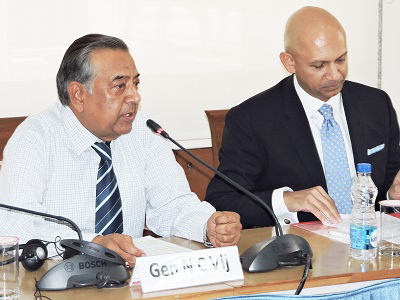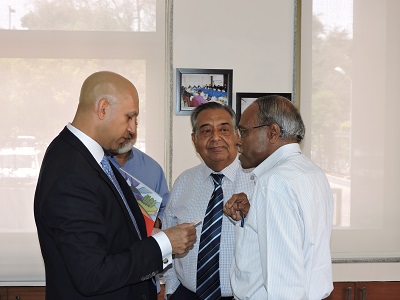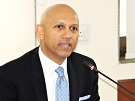A panel of eminent policy experts representing the Vivekananda International Foundation (VIF), including representatives from the Confederation of Indian Industries (CII) and Defence Research & Development Organisation (DRDO), among others, engaged H.E. Nadir Patel, Canada’s High Commissioner to India, over a range of bilateral issues on 11 April 2016. The interaction focused on figuring out ways in which bilateral cooperation between the two countries could be put on a fast forward in a mutually agreeable fashion, especially in the context of agreements reached between the two countries during Prime Minister Mr. Narendra Modi’s visit to Canada in April 2015.
 In his opening remarks General NC Vij, Director, VIF, expressed satisfaction over the fact that cooperation between India and Canada has been on an upward trajectory in recent years. While underscoring India’s commitment towards climate change, he stressed on the need for reinvigorating efforts in the direction of nuclear energy cooperation between the two countries. Besides, other envisioned areas for closer cooperation between the countries identified by the Director included oil & gas, science & technology, arctic research and terrorism. He specifically mentioned, countries around the world need to remain alive to the threat of nuclear proliferation, especially to the threat of dirty bombs falling into the hands of terrorist organizations such as Daesh. General Vij however exuded confidence that relationship between India and Canada will scale to new heights in the years ahead, his optimism bolstered by the current dynamic leadership that both countries currently have.
In his opening remarks General NC Vij, Director, VIF, expressed satisfaction over the fact that cooperation between India and Canada has been on an upward trajectory in recent years. While underscoring India’s commitment towards climate change, he stressed on the need for reinvigorating efforts in the direction of nuclear energy cooperation between the two countries. Besides, other envisioned areas for closer cooperation between the countries identified by the Director included oil & gas, science & technology, arctic research and terrorism. He specifically mentioned, countries around the world need to remain alive to the threat of nuclear proliferation, especially to the threat of dirty bombs falling into the hands of terrorist organizations such as Daesh. General Vij however exuded confidence that relationship between India and Canada will scale to new heights in the years ahead, his optimism bolstered by the current dynamic leadership that both countries currently have.
H.E. Nadir Patel touched on a number of key bilateral issues, both challenges and opportunities, as part of his initial presentation. Besides giving a brief intro about his government, the High Commissioner also listed out key priorities of his government in areas such as governance, economic policies and international relations.  Among the many firsts to the credit of this new government in Canada, it is for the first time in the history of Commonwealth countries that a third party has risen to power. The election, held last October, saw an unprecedented 19 persons of Indian origin being represented, of which four are in the Cabinet including a Sikh holding a Defence portfolio. It is an inclusive, transparent and forward looking government whose economic priorities are mainly focused on the middle class. In so far as the Government’s foreign policy priorities are concerned, the driving imperatives include multilateralism, humanitarian assistance, climate change, Syrian crisis and anti-terrorism, among others. The government has a list of over hundred priorities, distributed evenly among the council of ministers, with improvement in relations with India being one of the top priorities for the government. Canada’s budget passed recently is a reflection of the Government’s priorities. It is these priorities that will drive much of Canada’s external policies, including its policies towards India, the High Commissioner stated in his presentation. Significantly, the High Commissioner drew a number of parallels between India and Canada, especially in terms of economic priorities and policy making.
Among the many firsts to the credit of this new government in Canada, it is for the first time in the history of Commonwealth countries that a third party has risen to power. The election, held last October, saw an unprecedented 19 persons of Indian origin being represented, of which four are in the Cabinet including a Sikh holding a Defence portfolio. It is an inclusive, transparent and forward looking government whose economic priorities are mainly focused on the middle class. In so far as the Government’s foreign policy priorities are concerned, the driving imperatives include multilateralism, humanitarian assistance, climate change, Syrian crisis and anti-terrorism, among others. The government has a list of over hundred priorities, distributed evenly among the council of ministers, with improvement in relations with India being one of the top priorities for the government. Canada’s budget passed recently is a reflection of the Government’s priorities. It is these priorities that will drive much of Canada’s external policies, including its policies towards India, the High Commissioner stated in his presentation. Significantly, the High Commissioner drew a number of parallels between India and Canada, especially in terms of economic priorities and policy making.  While the High Commissioner pointed out India-Canada relations are at its best today, both sides need to continuously work on it. H.E. Nadir Patel also emphasized that while the bilateral relationship draws its strength from many linkages that exist between the two countries, it is important to have trust built into the relationship for its longevity.
While the High Commissioner pointed out India-Canada relations are at its best today, both sides need to continuously work on it. H.E. Nadir Patel also emphasized that while the bilateral relationship draws its strength from many linkages that exist between the two countries, it is important to have trust built into the relationship for its longevity.
An interactive session followed the High Commissioner’s presentation. While the interactive session remained swamped with economic issues, anti-terrorism cooperation between the two countries also substantially formed part of an intense discussion. Amb Rajagopalan, Amb Prabhat Shukla, Admiral Anoop Singh, Ashutosh Chadha (WIPRO), Ranjeet Goswami (Tata Consultancy services) and Vikas Khitha (L&T), among others, participated actively during the interactive session. Both sides underlined the need to engage each other more frequently in the future so as to take the bilateral process forward. General Vij concluded the session with his final comments.






